Volkswagen’s new Golf Estate is available to order in the UK now. It features the same level of technology as the hatchback variant but, thanks to a redesigned rear end, considerably more luggage capacity. Prices start from £24,575 for the entry-level Life variant, climbing to £35,560 for the range-topping off-road inspired Alltrack variant.
For now, buyers can choose from just four trim-levels – Life, Style, R-Line and Alltrack. However, the performance-focussed Golf R Estate flagship is expected to make a comeback during the new car’s production cycle, sporting an aggressive styling package, a 316bhp 2.0-litre four-cylinder petrol engine and four-wheel-drive.
- SEE MORE Best family cars to buy 2020/2021
The entry-level Life model comes with 16-inch alloy wheels, automatic LED headlights with scrolling indicators and a range of driver assistance technology including adaptive cruise control, front and rear parking sensors, a traffic sign recognition system and lane assist.
Inside, buyers get a leather-trimmed multifunction steering wheel, a 10-colour customisable ambient lighting system, a 10.25-inch digital instrument cluster and a 10-inch infotainment system with support for Apple CarPlay and Android Auto.
Style models start from £26,765 and add 17-inch alloy wheels, slightly better LED headlights with high beam assist, sports seats, a 30-colour customisable ambient lighting system and three-zone climate control. There are a few extra safety features, too, such as side assist, traffic jam assist and lane change assist.
Volkswagen’s sporty R-Line variant features a similar styling package to the upcoming R model, with lower front and rear bumpers, deeper side skirts and a slightly larger rear spoiler. Buyers also get 17-inch alloy wheels, rear privacy glass, sports suspension, a heated leather steering wheel and a new drive mode selector. Prices start from £28,075
The Golf Estate Alltrack makes a return. It’s only available with four-wheel-drive and features a host of SUV-inspired styling tweaks such as a raised ride-height, black plastic cladding around its wheel arches and bumpers, 17-inch alloy wheels and silver roof rails.
Buyers also get a backlit radiator grille and some extra technology – including Travel Assist semi-autonomous driving. The system can take control of the car’s steering, acceleration and braking on the motorway at speeds up to 130mph.
New Volkswagen Golf Estate: engines and drivetrains
The Golf Alltrack can only be specced with a turbocharged 2.0-litre four-cylinder diesel engine, which produces 197bhp. The unit sends drive to all-four wheels via a seven-speed automatic gearbox, providing a claimed WLTP fuel economy figure of 49.6mpg.
The remaining Golf Estate models are available with a choice of five engines, with buyers offered three petrols and two diesels. The entry-level petrol model is a turbocharged 1.0-litre three-cylinder unit, which generates 108bhp and returns up to 51.4mpg.
Volkswagen’s current flagship petrol model features a turbocharged 1.5-litre four-cylinder unit, which has 148bhp and claimed WLTP fuel economy figures from 45.6mpg. Between the two sits a slightly less powerful, although slightly more efficient version of the same unit, which has 128bhp and the same economy figures as the base-model.
All three engines come with a six-speed manual gearbox as standard. However, when fitted with Volkswagen’s optional seven-speed DSG, all three gain mild-hybrid assistance. The hybrid system increases the 1.0-litre’s fuel efficiency to 53.3mpg, while the 1.5-litre’s figures rise to a claimed 46.3mpg.
Both diesel engines are based on the same turbocharged 2.0-litre four-cylinder unit, and Volkswagen says both can achieve economy figures into the 60mpg range. Buyers have their choice of two outputs; the entry-level model produces 113bhp, while the more potent variant has 148bhp.
New Volkswagen Golf Estate: design and interior
The Mk8 Volkswagen Golf Estate is a fair bit longer than the old model – overall, its 35cm longer than the Mk7, while its wheelbase has grown by 66mm. As a result, boot space stands at 611 litres with the rear bench in place and 1,642 litres with the seat stowed.
While the extra space will surely be welcomed by family buyers, it’s worth bearing in mind that the Golf Estate’s boot still falls 50 litres short of the latest Skoda Octavia estate. The Golf’s luggage area does come with hooks, tie-down rings and lighting as standard, though, while a gesture-controlled tailgate can be specced as an optional extra.
The relatively modest gain in boot space over the old model reflects that Volkswagen has used the extra length to fit a more rakish rear screen, in an attempt to give the Golf Estate a sportier look. The car is identical to the hatchback up to the B-pillars, though, with the same new front-end and daytime running lights.
Inside, the estate’s front cabin will look familiar to anyone who’s seen the hatch. There are fewer physical buttons than before, with heating and ventilation controls integrated into a touch-sensitive bar that runs beneath the infotainment screen. A fully digital instrument panel is also standard across the range.
Now read our in-depth review of the new Volkswagen Golf hatchback…
from Sitewide RSS feed https://ift.tt/2HGL8Xa
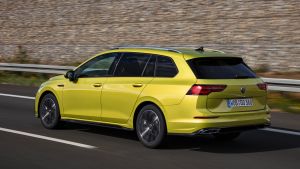

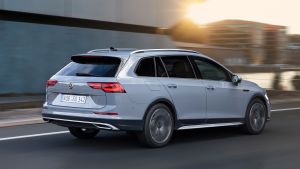
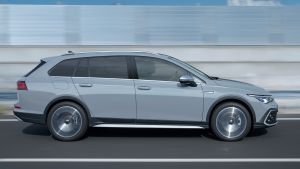
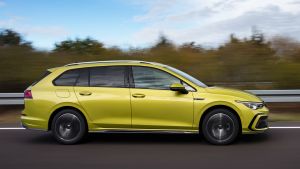

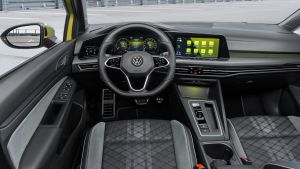
No comments:
Post a Comment